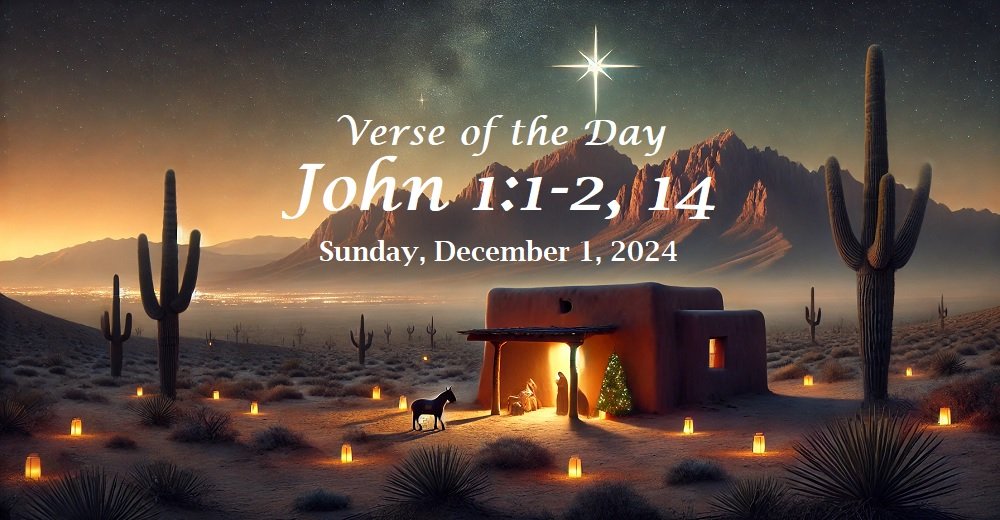John 1:1-2, 14
Verse of the Day
Sunday, December 1, 2024
John 1:1-2, 14
In the beginning was the Word, and the Word was with God, and the Word was God. He was in the beginning with God.… And the Word became flesh and lived among us, and we have seen his glory, the glory as of a father’s only son, full of grace and truth.
Introduction
The opening verses of John’s Gospel, John 1:1-2 and 14, are some of the most profound and foundational passages in Scripture. These verses establish the identity of Jesus Christ as the eternal Word of God, linking the divine nature of Christ with His incarnation. They set the stage for understanding the mystery of God becoming human to dwell among His creation.
Commentary
John 1:1-2
"In the beginning was the Word, and the Word was with God, and the Word was God. He was in the beginning with God."
John begins his Gospel with a deliberate echo of Genesis 1:1, emphasizing Jesus' preexistence and divinity. The "Word" (Greek: Logos) is not just an abstract principle but a person—Jesus Christ. The term Logos would have resonated with both Jewish and Greek audiences, as it conveyed the idea of divine wisdom, creative power, and reason. John affirms that Jesus, the Word, was both distinct from God (as He was "with God") and fully divine (as "the Word was God"). This duality sets the foundation for understanding the Trinity.
John 1:14
"And the Word became flesh and lived among us, and we have seen his glory, the glory as of a father’s only son, full of grace and truth."
The incarnation—God taking on human flesh—is one of the central mysteries of the Christian faith. By becoming flesh, the eternal Word entered the temporal world, bridging the infinite gap between God and humanity. The phrase "lived among us" (literally, "tabernacled among us") evokes imagery of God dwelling with His people, as He did in the wilderness through the Tabernacle. The glory of Christ, as the Father's "only son," reflects His divine nature, characterized by grace and truth—a theme that pervades John's Gospel.
Understanding the Context
John wrote his Gospel to establish the divinity of Christ and His mission of salvation. At the time, there were competing philosophies and heresies that questioned who Jesus was. By emphasizing Jesus' eternal nature and His incarnation, John addresses misunderstandings about His identity. These verses also resonate with the broader narrative of Scripture, showing God's desire to dwell with His people, from the Garden of Eden to the New Jerusalem.
Application for Today
1. Understanding Christ's Divinity: John’s declaration of Jesus as the eternal Word invites believers to deepen their understanding of who Christ is. Recognizing Jesus as fully God and fully man strengthens our faith and reassures us of His power to save.
2. God’s Presence in Our Lives: The incarnation reveals that God is not distant but intimately involved in our world. In our struggles and joys, we can find comfort in knowing that God understands human experience because He lived it.
3. Living Grace and Truth: As followers of Christ, we are called to emulate His example of grace and truth. This means balancing compassion with integrity in our relationships and witness.
Reflection
Take a moment to ponder the profound mystery of the incarnation. Consider what it means for the eternal, infinite God to step into time and space for your redemption. How does this truth affect your understanding of God's love for you and His call for you to share that love with others? Reflect on how you can live out grace and truth in your daily life, embodying the light of Christ to a world in need.
Let this passage inspire awe and deepen your relationship with the One who is both the Creator of all things and the Savior of your soul.
The Bible texts are from the New Revised Standard Version (NRSV) Bible, copyright © 1989, 1993 the Division of Christian Education of the National Council of the Churches of Christ in the United States of America. Used by permission. All rights reserved. Verse of the Day is a daily inspirational and encouraging Bible verse extracted from BibleGateway.com. Commentary by Kenny Sallee, ThM.
